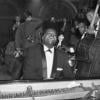
In 2013, jazz pianist, composer, and educator Darrell Grant received an invitation. Would he be interested in putting together a band to play a tribute concert to the Modern Jazz Quartet at the Portland Jazz Festival?
It was a natural opportunity for Grant, who’s always had classical leanings. After all, starting in 1952, MJQ pioneered the kind of mid-20th-century jazz-classical fusions once termed “third stream.” The deep and abiding affections that MJQ pianist and leader John Lewis had for both bop and Bach shone through his chamber jazz compositions and arrangements. And the creative tension between his cool, concise counterpoint and co-frontliner Milt Jackson’s hard-swinging, blues-bred vibraphone mastery imbued MJQ with a combustible power that belied its seemingly reserved presentation. The band wore tuxes and insisted on being treated as the highly skilled professionals they were, just as any white classical musician would be.

Grant, too, has long and fruitfully explored the false borders between jazz and classical music. During his New York years in the 1990s, his swinging small combos, influenced by jazz and other Black music of the mid-to-late 20th century, won admiration from both critics and listeners. The New York Times named his 1994 album Black Art, which featured some fellow future stars — drummer Brian Blade, bassist Christian McBride, and trumpeter Wallace Roney — one of its top 10 jazz albums of the year.
But after Grant, who grew up in Denver, returned to the West in 1996 to take a teaching position at Portland State University, he was able to explore his ardor for classical forms and influences, composing impressive long-form suites for chamber orchestras, multimedia works, and even operas. He is the immediate past vice president of Chamber Music America and is a member of the Jazz Society of Oregon Hall of Fame, among many other honors.
That 2013 festival gig proved so successful that Grant and his bandmates decided to keep it going, periodically reuniting between their myriad other projects. They’ve developed an original approach inspired but not dictated by their illustrious predecessors. More than a cover band or tribute project, MJ New is a creative collaboration among accomplished jazz musicians who take the framework created by MJQ and use it to make original, broadly appealing mainstream jazz for 21st-century listeners.
Last year, the group dropped an album, Our Mr. Jackson, featuring not only MJQ covers but also originals and works by Franz Schubert, Antônio Carlos Jobim, Duke Ellington, Terence Blanchard, and Mary Lou Williams. This week, Grant and his band — vibraphonist Mike Horsfall, bassist Marcus Shelby, and drummer Cecil Brooks III — bring their music to the Bay Area for three shows: at the Yerba Buena Gardens Festival on June 13 (afternoon), at The Sound Room in Oakland on June 13 (evening), and as part of the Healdsburg Jazz Festival’s Juneteenth Celebration on June 15.

MJ New’s music is also informed by its predecessor’s social and historical significance. “The Modern Jazz Quartet was in many ways a Petri dish for the tension between jazz as an art form,” Grant blogged recently, “playing the role of cultural ordnance in the battle to prove that 400 years of Black contributions to the American experiment deserved our country’s respect.”
Grant added in an interview with SF Classical Voice that he appreciates “the connection to Black history and what [MJQ], coming out of the Harlem Renaissance, represented in the legacy of Black achievement and the level of artistry and sophistication they were pursuing.”
Such connections appeal to a musician renowned in Oregon for his thoughtful, eloquent social justice advocacy. Many of Grant’s musical projects arise from the historical and contemporary struggles for civil rights and racial equality. The Artist as Citizen course he co-created at Portland State trains students in the social engagement aspect of their art. “Crossing the Bridge: Vanport,” an original composition on the MJ New album, references the displacement of residents from Portland’s neighboring city, Vanport — a population that was 40 percent Black, wiped out by a flood after World War II, and never rebuilt.
This week’s Bay Area shows will include tunes from that album, as well as “a few new arrangements and standards that apply the aesthetic lens of what we do to what MJQ did before,” Grant said. After 11 years of deep immersion in MJQ’s legacy, “we’ve internalized all that and just play the music we want to play,” Grant explained. “We have a legacy of our own now, so [MJNew] is not so much a tribute to [MJQ] but our response to it.”
Still, Grant and MJ New have a crucial lesson they’ve learned from MJQ. Four highly individualistic, sometimes contentious contributors can achieve a whole greater than the sum of their considerable parts by occasionally deferring to each other.
“For me, the growth is letting go of the control of what my vision is,” Grant mused. “I’m really much more mature now in my willingness to actually collaborate, to allow others to have an equal part. You have to be willing to enjoy that process of accepting what makes that unique sound. The opera and large composition projects I’ve done were a way of exploring my [individual] voice.” And although Grant brings some of those classical influences to his quartet, “MJNew is a place where I get to converse in that language we’ve developed together.”




